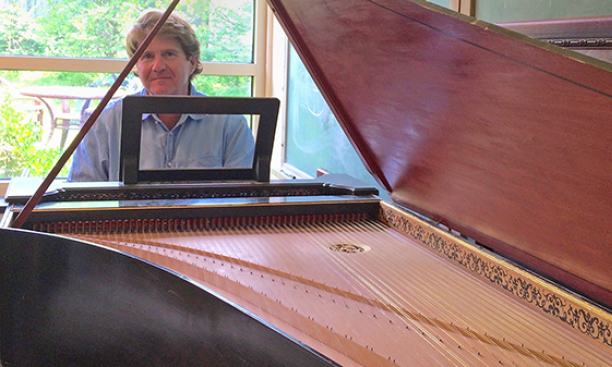

Gavin Black ’79 has devoted his entire adult life to studying, performing, teaching, and recording 17th- and 18th-century keyboard music. But he knows that studying Baroque music on antique instruments isn’t an easy sell.
“The harpsichord is not remotely as popular as the piano,” he laughs from a bench at the Princeton Early Keyboard Center, the non-profit music studio he founded in 2001. It offers harpsichord, clavichord, and organ lessons for students, composers, and group classes.
Black discovered the organ and harpsichord at age 14, after a stint taking piano lessons left him curious about Baroque music.
As a freshman at Princeton, he would practice the organ alone in the vast and empty University Chapel, lit only by moonlight, courtesy of a special access key. He served as an assistant university organist at Princeton, and recorded an album on a harpsichord he kept safe in his senior-year dorm room.
Black earned his Master of Music degree from Westminster Choir College, and he has been teaching the organ, harpsichord, and clavichord for over 30 years.
Though the Princeton Early Keyboard Center occupies only one room within Christ Congregation Church, across the street from Westminster Choir College, the carefully air-conditioned studio holds no fewer than five instruments, each uniquely ornate: a late-17th century Italian harpsichord; a mid-18th century German clavichord; a Flemish-style harpsichord build in 1986 by Hill & Tyre; a small Renaissance-style clavichord built in 1983 by Hill & Tyre; and a German-style, two-keyboard harpsichord built in 1978 by Keith Hill.
When asked to compare his teaching studio to a piano studio, Black is hesitant at first. “I’m delighted by all of the piano teachers sending students our way,” he says. But, he adds, “Any piano teacher who puts up a sign can get 40, 50 students.”
He pauses. “It’s like when there’s a lot of pizzerias in one neighborhood. They’re a colleague on one level, a competitor on another level.”
Yet the Princeton Early Keyboard Center has survived. In fact, this year is the studio’s largest yet, with 14 students. Black’s students range from curious amateurs who “stumble on it somehow” and are “intrigued by the sound” to professional organists, pianists, and music teachers. Some students even take long-distance lessons via Skype. Their ages span from 13 to 89.
Black seems proud that they don’t necessarily fit the profile of the “typical” music student.
“No one ever walks in this door because they’re forced to,” he smiles. “No one here is being forced to take lessons by their parents.”
“I couldn’t do it otherwise,” he says. “All of my students want to be here.”
The Princeton Early Keyboard Center holds an annual recital series that showcases students, guest performers, and Gavin Black. To listen to Black’s organ and harpsichord performances, visit http://bit.ly/GBlack-YT and http://bit.ly/GBlack-SC.
